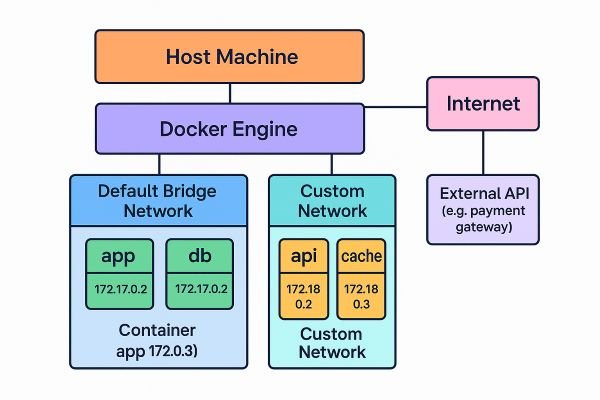Content
- Introduction: Docker Compose Not Responding
- Why Does Docker Compose Not Responding?
- Step 1: Check Your System Resources and Docker Engine
- Step 2: Validate Your YAML File
- Step 3: Fix Network Problems
- Step 4: Clear Old Docker Data
- Step 5: Update Software and Dependencies
- Conclusion: Docker Compose Not Responding
- FAQs:
Introduction: Docker Compose Not Responding
Running into the Docker Compose Not Responding issue? You’re not alone. Sometimes, when you use commands like docker-compose up, everything just freezes—with no clear error. It’s frustrating—and can slow down your workflow. The usual causes? Low system resources, YAML mistakes, or network issues. In this guide, you’ll learn 5 simple steps to fix it, along with real-world tips, a diagram. Let’s get started!
Why Does Docker Compose Not Responding?
Before we dive into fixes, let’s pinpoint why Docker Compose stops responding. After all, spotting the root cause makes everything else easier. So, let’s break it down. Here are the usual suspects:
- Low Resources:
Sometimes, your system simply doesn’t have enough power. It might run low on CPU (Central Processing Unit), memory, or disk space. When that happens, Docker Compose can’t do its job properly. - YAML Errors:
Next, take a look at yourdocker-compose.ymlfile. Even a tiny typo or misaligned space can break things. Since YAML (YAML Ain’t Markup Language) is indentation-sensitive, one small error often causes a big issue. - Network Issues:
Then comes networking. You may face conflicts or attempt to reach services that aren’t available.. As a result, your containers may stall or hang without any warning. - Stale Data:
Also, old containers or leftover volumes can cause trouble. If they’re not cleaned up properly, they interfere with new builds and run processes.
Outdated Software:
Finally, outdated Docker or Docker Compose versions often introduce bugs or create incompatibilities with new features. So, keeping them updated makes a difference.
Step 1: Check Your System Resources and Docker Engine
Why It Matters
First off, Docker Compose needs enough system resources to work smoothly. If your system is low on CPU, memory, or disk space, it might cause Docker Compose to freeze. In the same way, issues with the Docker Engine—the core service that runs containers—can also lead to unexpected hangs or slowdowns.
So, before diving into complex fixes, take a moment to check your system’s health. A quick look at your resource usage could save you a lot of time.
How to Fix It
Here’s how to check and fix resource issues:
- Monitor Resources:
- On Linux or macOS, run
toporhtopto check CPU and memory. - For Windows, open Task Manager.
- Make sure you have at least 4GB of free RAM and 10GB of disk space.
- If resources are tight, close unused apps or reduce the number of containers running.
- On Linux or macOS, run
- Check Disk Space:
- Use
df -h(Linux/macOS) ordirin PowerShell (Windows) to check available space.
Low on space? Run this cleanup command:docker system prune -a --volumes
⚠️ Warning: This deletes unused images and volumes. Back up anything important before running it.
- Use
- Verify Docker Engine:
- Check if your Docker daemon is running:
sudo systemctl status dockerOn Windows, try:Get-Service -Name docker - If it’s stopped, start it:
sudo systemctl start docker - Next, check your Docker version:
docker --version - If outdated, update it. Check the Docker Installation Guide for steps.
- Check if your Docker daemon is running:
Pro Tip
To prevent resource hogs, set limits in your docker-compose.yml:
services:
app:
image: my-app:latest
deploy:
resources:
limits:
cpus: '0.5'
memory: 512M
Step 2: Validate Your YAML File
Why It Matters
Next, let’s talk about the docker-compose.yml file. It’s the heart of your setup. However, a single typo or wrong setting can make Docker Compose freeze. For example, a misplaced colon or incorrect service name can stop everything.
How to Fix It
Here’s how to debug your YAML file:
- Check Syntax:
- Run this command to validate:
docker-compose -f docker-compose.yml configThis catches errors like bad indentation or missing fields.
- Run this command to validate:
- Use Verbose Mode:
- Add
--verboseto see detailed logs:docker-compose up --verboseConsequently, you’ll spot where things get stuck, like a failed database connection.
- Add
- Simplify the File:
- Comment out complex parts, such as volumes or networks.
- Test with a minimal setup:
version: '3.8' services: app: image: nginx:latest ports: - "8080:80"If this works, add services back one by one.
- Use a Linter:
- Try YAML Lint. Paste your file to find sneaky errors.
Real-Life Example
A fintech startup faced a strange issue—Docker Compose just froze during startup. At first, they couldn’t figure out why. Everything looked fine in their docker-compose.yml file. But then, they ran docker-compose config to double-check the setup. That’s when they spotted it. Turns out, under the depends_on field, they had written db-server instead of the correct service name, db. Just a small typo—but it broke everything. Once they fixed the name and restarted Docker Compose, everything ran smoothly again.
Step 3: Fix Network Problems
Why It Matters
Now, let’s tackle network issues. It automatically creates networks to let your containers communicate. However, network misconfigurations or DNS issues can still cause Docker to freeze. Fortunately, a few checks can sort this out.
How to Fix It
Try these steps:
- List Networks:
- Check all Docker networks:
docker network ls - Look for IP conflicts or stale networks. Then, remove unused ones:
docker network prune
- Check all Docker networks:
- Test Connectivity:
- If a service needs an external resource, test it:
docker-compose exec <service-name> ping <external-host> - If it fails, check your firewall or DNS settings.
- If a service needs an external resource, test it:
- Recreate Networks:
- Force Docker to rebuild networks:
docker-compose up --force-recreate
- Force Docker to rebuild networks:
- Use Default Network:
- Switch to Docker’s default bridge network:
services: app: image: my-app:latest network_mode: bridge
- Switch to Docker’s default bridge network:
Architecture Diagram
Here’s a simple view of Docker Compose networks:

This diagram shows how containers connect. Misconfigurations here can block communication.
Step 4: Clear Old Docker Data
Why It Matters
Sometimes, old containers, volumes, or images cause conflicts. As a result, Docker Compose can freeze. Clearing this stale data resets your environment cleanly.
How to Fix It
Here’s what to do:
- Stop and Remove Containers:
- Stop your project’s containers:
docker-compose down - Then, delete them:
docker-compose rm -f
- Stop your project’s containers:
- Remove Volumes:
- Clear unused volumes:
docker volume pruneNote: Back up critical data first.
- Clear unused volumes:
- Delete Unused Images:
- To clean up unused images and save disk space, use:
docker image prune -a
- To clean up unused images and save disk space, use:
- Restart Docker:
- Refresh the Docker daemon:
sudo systemctl restart dockerOn Windows, restart Docker Desktop via the app.
- Refresh the Docker daemon:
Pro Tip
Automate cleanups with a script:
#!/bin/bash
docker system prune -a --volumes --force
docker network prune --force
Run this weekly to keep things tidy.
Step 5: Update Software and Dependencies
Why It Matters
Finally, outdated software can cause freezes. For example, old Docker Compose versions or mismatched images might not play well together. Keeping everything updated ensures smooth operation.
How to Fix It
Follow these steps:
- Update Docker Compose:
- Check your version:
docker-compose --version - Upgrade via Docker Compose Installation.
- Check your version:
- Update Images:
- Use specific tags (e.g.,
nginx:1.23) to avoid issues. - Pull fresh images:
docker-compose pull
- Use specific tags (e.g.,
- Check Dependencies:
- Rebuild custom images if libraries clash:
docker-compose build
- Rebuild custom images if libraries clash:
- Add Healthchecks:
- Ensure services wait for dependencies:
services: db: image: postgres:latest healthcheck: test: ["CMD-SHELL", "pg_isready -U postgres"] interval: 5s timeout: 5s retries: 5 app: image: my-app:latest depends_on: db: condition: service_healthy
- Ensure services wait for dependencies:
Real-Life Example
A SaaS company had Docker Compose suddenly stop working. At first, they assumed it was a resource issue—so they restarted everything. But nothing helped.
Then, after checking logs, they found the problem: the mysql:5.7 image wasn’t working well with a new client library.
So, they made a smart move. They switched to mysql:8.0 and ran a fresh build using docker-compose up --build. And just like that, the issue disappeared.
Click here to get more insight about: Awesome Tips to Beat Docker Security Vulnerabilities
Conclusion: Docker Compose Not Responding
Docker Compose is great, but when it freezes, it’s frustrating. Luckily, most issues—like low resources, bad YAML, or network glitches—are easy to fix.
Start by checking system resources and validating your YAML. Then, look at network settings and clear old containers, images, and volumes. Updating Docker and Compose often helps too.
Use specific image tags and healthchecks for more stability. And don’t forget to schedule regular cleanups to keep things smooth.
So next time Docker Compose stalls, try these quick fixes—you’ll be back to coding in no time!
Click here for more insights on various Cloud Computing || Automation || Cyber-Security
FAQs:
Why is Docker Compose not responding on my system?
Answer: Docker Compose may stop responding for several reasons. Most commonly, it happens due to low memory, conflicting ports, or an outdated Docker version.
However, it could also be caused by a stuck container or a misconfigured YAML file. To fix it, start by checking your container logs. Then, restart Docker and make sure your system has enough resources to run containers smoothly.
How do I fix Docker Compose not responding error?
Answer: Don’t worry—this is fixable. First, run docker-compose down to stop the containers.
Next, clear out all unused resources by running: docker system prune -a. This clears old containers, networks, and volumes that might be causing the freeze.
Finally, bring everything back up with docker-compose up --build. This rebuilds your containers and often solves the issue.
Can Docker Compose not responding be due to network issues?
Answer: Yes, and believe it or not, it’s a pretty frequent issue. Sometimes, multiple containers try to use the same port, which leads to conflicts. As a result, Docker Compose may freeze or fail to start services properly.
To check this, run docker network ls and inspect your custom network settings. Then, look at your docker-compose.yml file to make sure there are no duplicate ports or invalid configurations.
Does low disk space cause Docker Compose not responding?
Answer: Absolutely. If your system runs low on disk space or RAM, Docker Compose may freeze or stop responding. When that happens, clean up is key. Use docker system prune to clean up space and get rid of unused resources.
Also, make sure your Docker daemon has enough memory and storage assigned—especially if you’re running multiple services at once.

